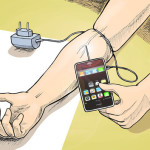 Recently I banished iPhones and PDA’s from company meetings. Over time it had become increasingly common to see staff checking their phones while a colleague tried to bring their attention to an issue. Or worse, they’d begin texting. Not only is such behavior rude, study after study has shown that you cannot divide your attention between your phone and a conversation and do justice to either. “Not unless you are negotiating Middle East peace,” went the one caveat I offered for getting on the phone during a meeting. Our confabs aren’t very long, and if someone is expecting a call they can always bow out or reschedule it.
Recently I banished iPhones and PDA’s from company meetings. Over time it had become increasingly common to see staff checking their phones while a colleague tried to bring their attention to an issue. Or worse, they’d begin texting. Not only is such behavior rude, study after study has shown that you cannot divide your attention between your phone and a conversation and do justice to either. “Not unless you are negotiating Middle East peace,” went the one caveat I offered for getting on the phone during a meeting. Our confabs aren’t very long, and if someone is expecting a call they can always bow out or reschedule it.
I became alert to the issue when I noticed people glancing at their phones during customer visits. Doing so just communicates exactly what you don’t want in the first place. If I’m the customer I take away that we aren’t terribly important. It doesn’t matter if you check by looking down at a phone slightly obscured by a table. You can’t hide downcast eyes, nor fingers working quickly on a message. Everyone present knows exactly what’s going on. More importantly, the customer knows we’re not paying attention.
I don’t think anyone at our company means to be rude. We’re just part of a culture that has become addicted to our phones. Surveys show, for instance, that over 50% of Stanford University students believe they’ve developed an iPhone “habit”. An unbelievable 8% report feeling that their iPad is jealous of their iPhone (these kids are smart?). Businesspeople obviously aren’t immune. We’ve become accustomed to putting our phones in our pockets and on our desks or on conference tables just waiting for that tweet, text, email or call to come through that requires seemingly immediate attention. Meanwhile those around us suffer from the attention deficit of others.
Worse yet, I think, people generally, especially younger employees, refuse to phone about an issue. Instead they’d rather email or text. When they email the cc line gets so crammed full of names it seems like a birthday invitation. Then everyone kicks back their comments with those on the cc line getting whipped through circuits of information they often don’t need. A wonderful rule I heard one company adopt states that after the third round emailing about an issue employees had to pick up the phone. Hearing a voice also helps develop a personal relationship in a way a message does not.
Some object to calling because they desire a paper trail. They want proof a supplier or customer agreed to something. The alternative? Summarize the phone call in an email, or better yet, trust that an understanding has been reached like we did in days of old. Where agreement needs documentation, say like on pricing or scheduling, a quick note following a conversation should suffice. If we are so suspicious of each other that we need documentation of every exchange, then other problems exist, trust being the most obvious.
Digital communications can present other tripwires. Even in my wise old age I misunderstand tone in emails. I don’t know how many times I’ve taken umbrage at something written only to find out I got it wrong. On the equal and opposite side I’ve seen emails from normally balanced individuals that libel the recipient. If the person had walked down the hall to work through the dispute, or picked up the phone, they wouldn’t have raised their blood pressure and that of others. Instead, whatever caused the issue to devolve would have gotten solved.
I know I am no saint when it comes to iPhone abuse. Too often I forget to turn it off when I get to the office. Then it rings during a meeting. I’ve written angry emails when I should have picked up the phone. I’ve disciplined myself over the last year to put those aside to decide once I’ve calmed down whether to hit “Send”. Usually I end up spiking them. My one exception: Complaint emails to airlines. I figure venting can’t hurt because no one reads them anyway.
The final frontier remains internet use. Games, shopping, stock trading, and so on also clog working hours, often leading to longer less productive days. My first boss in journalism was an exceptionally disciplined man. He came at 9, left at 5, and wrote more stories in a year than just about anyone else. Our chief operating officer Pallavi Joyappa is much the same. I’m not there yet, but I’ve started to wean from Google.
I hope our iPhone policy helps us have more productive meetings. Undoubtedly the messages will wait for us. Unless its President Obama texting for advice on Syria. Then company policy says make excuses, quickly step outside and answer.
